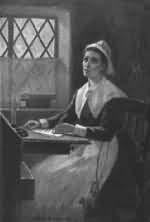Anne Bradstreet on Pilgrimage

We live in a world of suffering, though those in the twenty-first–century West admittedly enjoy many material, medical, and technological luxuries that make life easier than it is for many around the world today. Still, when we suffer, our gut reaction is often to complain and ask, “Why?”
Nearly four hundred years ago, a Puritan housewife faced severe trials and suffering in the wilderness of colonial America. Anne Bradstreet (1612/3–1672) too sought answers about illnesses, traveling dangers, and the deaths of young grandchildren. As she reflected on the difficulties in her world, she framed her thoughts using the metaphor of pilgrimage.
Anne Bradstreet was the first colonial American woman to publish a book and the first colonial American—male or female—to publish a book of poetry. Her work, The Tenth Muse Lately sprung up in America. Or Severall Poems … By a Gentlewoman in those parts, was first published by family and friends in 1650 without her knowledge or consent. A second edition with her corrections and some additional poems appeared posthumously in 1678 with the more modest title, Several Poems … By a Gentlewoman in New England. In 1867 John Harvard Ellis added several other private poems of hers to his critical edition of her works (available on Google Books).
In Bradstreet’s poetry, readers find the reflections of a woman who thought carefully about the human experience in this world and tempered it with thoughts of the next. As she captured in one of her meditations, “If we had no winter the spring would not be so pleasant: if we did not sometimes tast of adversity, prosperity would not be so welcome.”[1]
Pulling from another image, Bradstreet compared the comforts of this life to “the gourd of Jonah.” Just as the gourd withered and died because of a worm, so our comforts are corrupted by “some worm or other of discontent, of feare, or greife that lyes at the root, which in great part withers the pleasure which else we should take in them.” Such worms are necessary, Bradstreet believed, for “were earthly comforts permanent, who would look for heavenly?”[2]
In thinking about the heavenly destination of believers, Bradstreet appropriated the image of pilgrimage, casting our journey in this temporal world in light of our permanent residence in eternity. In one case, she compared the Christian to an individual sailing to a faraway country for business. Just as one enjoys the comforts of the boat’s cabin but seeks no permanent residence there, so in the same way,
“a Christian is sailing through this world unto his heavenly country, and heere he hath many conveniences and comforts; but he must beware of desire[ing] to make this the place of his abode, lest he meet with such tossings that may cause him to long for shore before he sees land. We must, therfore, be heer as strangers and pilgrims, that we may plainly declare that we seek a citty above, and wait all the dayes of our appointed time till our chang shall came.”[3]
Bradstreet applied the image of a “weary pilgrim” to herself in a poem she wrote near the end of her life.[4] As she grew older, she described her body as “my Clay house mouldring away” and waxed eloquently about the resurrection hope she had in Christ:
And when a few yeares shall be gone
this mortall shall be cloth’d upon
A Corrupt Carcasse downe it lyes
a glorious body it shall rise
In weaknes and dishonour sowne
in power ’tis rais’d by Christ alone
Then soule and body shall unite
and of their maker have the sight
Such lasting joyes shall there behold
as eare ne’r heard nor tongue e’er told
Lord make me ready for that day
then Come deare bridgrome Come away.[5] Bradstreet offers those in the twenty-first century perspective for the inevitable sufferings we face in this world. For those who share her faith in Christ and her hope of the resurrection, the pilgrim motif provides a way of processing our experiences in this world that echoes the words of Saint Paul, who contrasted those “with minds set on earthly things” with followers of Christ:
“But our citizenship is in heaven, and from it we await a Savior, the Lord Jesus Christ, who will transform our lowly body to be like his glorious body, by the power that enables him even to subject all things to himself” (Phil 3:19–21).
[1] Anne Bradstreet, “Meditations, Divine and Moral,” in The Works of Anne Bradstreet in Prose and Verse, ed. John Harvard Ellis (Charlestown: Abram E. Cutter, 1867), 51. I have retained the original spellings.
[2] Bradstreet, “Meditations, Divine and Moral,” in Works, 69.
[3] Bradstreet, “Meditations, Divine and Moral,” in Works, 62.
[4] Bradstreet, “Verses: Longing for Heaven, Aug. 31, 1669,” in Works, 42.
[5] Bradstreet, “Verses: Longing for Heaven, Aug. 31, 1669,” in Works, 43–44.

